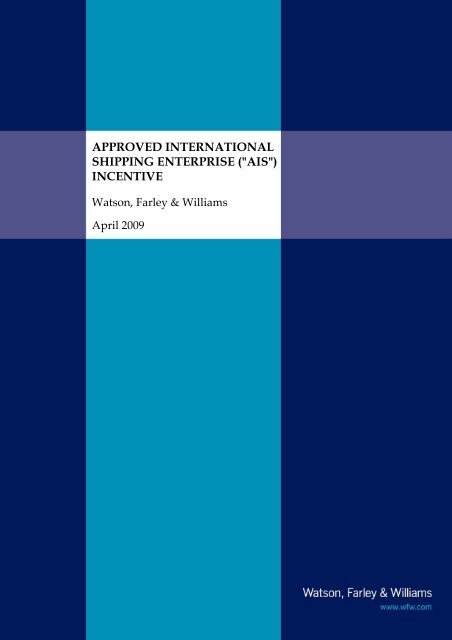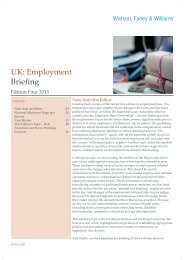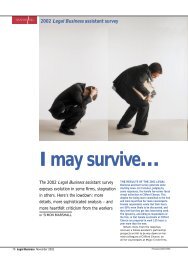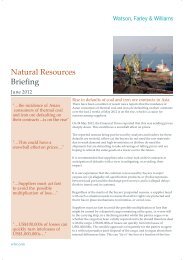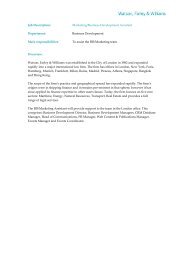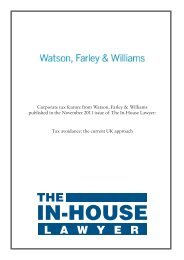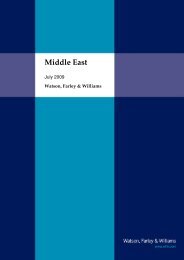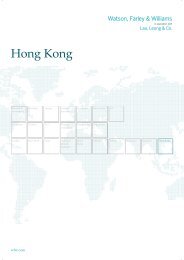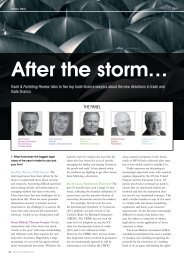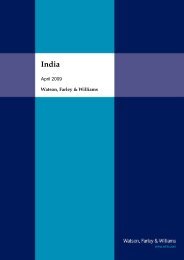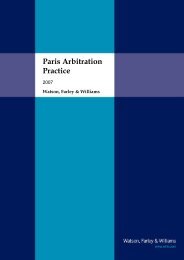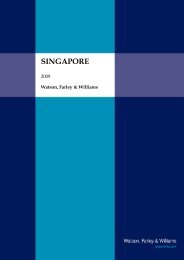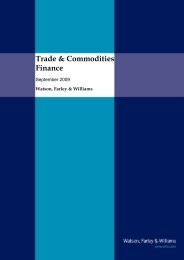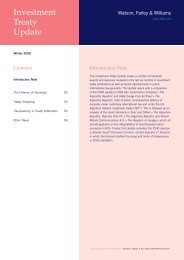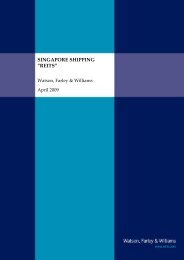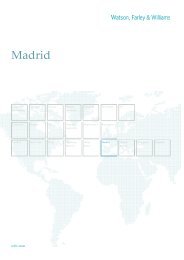("ais") incentive - Watson, Farley & Williams
("ais") incentive - Watson, Farley & Williams
("ais") incentive - Watson, Farley & Williams
Create successful ePaper yourself
Turn your PDF publications into a flip-book with our unique Google optimized e-Paper software.
APPROVED INTERNATIONAL<br />
SHIPPING ENTERPRISE ("AIS")<br />
INCENTIVE<br />
<strong>Watson</strong>, <strong>Farley</strong> & <strong>Williams</strong><br />
April 2009<br />
18093869 v3
Contents<br />
INTRODUCTION...................................................................................................................3<br />
THE INCENTIVES ................................................................................................................4<br />
GUIDELINES FOR GRANTING OF AISE STATUS ............................................................6<br />
COMMENTS .........................................................................................................................8<br />
SCHEDULE ........................................................................................................................11<br />
ANNEX A ............................................................................................................................13<br />
OUR OFFICES....................................................................................................................15
WATSON, FARLEY & WILLIAMS LLP<br />
Introduction<br />
Since 1969, profits from the operation of Singapore flag ships in international waters have<br />
been exempt from income tax in Singapore. This exemption assisted in the substantial<br />
expansion of the Singapore fleet during the 1970s and 1980s. However, in many cases<br />
there was little further benefit to Singapore and its economy, since a large part of that fleet<br />
was operated, both commercially and technically, outside Singapore.<br />
In order to help develop Singapore into a truly international maritime centre and to<br />
encourage major shipowners (both local and foreign) to increase the use of Singapore as<br />
a base for the management and control of their shipping operations, Singapore introduced<br />
in 1991 a tax <strong>incentive</strong> under the Approved International Shipping Enterprise ("AISE")<br />
Incentive Scheme to exempt shipping companies awarded AISE status from tax on the<br />
income from vessels operated by them, whether registered under Singapore flag or<br />
elsewhere.<br />
3
WATSON, FARLEY & WILLIAMS LLP<br />
The Incentives<br />
1 Under this <strong>incentive</strong>, companies granted AISE status essentially obtain tax<br />
exemption on the following income:<br />
(a)<br />
(b)<br />
(c)<br />
income from the operation or charter of non-Singapore flagged ships in<br />
international waters (income from the operation of Singapore flagged ships is in<br />
any event exempt from Singapore income tax under long-standing legislation,<br />
whether or not the owner/operator has been granted AISE status) which includes<br />
time and voyage charter hire, freight income and pool distributions for such ships,<br />
as well as foreign exchange gains and gains from risk management activities i.e.<br />
derivatives (that are not excessive compared to freight revenues) - please see<br />
also paragraphs 11 and 12 below;<br />
qualifying dividends from approved subsidiaries and associated shipping<br />
companies; and<br />
gains from the sale of vessels owned by the AISE company (or by an approved<br />
subsidiary or approved shipping company).<br />
2 Further:<br />
(a)<br />
(b)<br />
the AISE company (or approved subsidiary or approved shipping company) may<br />
pay dividends from its tax-exempt income to its shareholders (whether foreign or<br />
local) without deduction/imposition of any tax in Singapore; and<br />
certain additional tax benefits (e.g. withholding tax exemption on charter hire) are<br />
available and there are referred to in paragraphs 13 to 16.<br />
3 Thus, a company granted AISE status need not itself directly own the vessels,<br />
which may be owned by overseas companies provided that the overseas ship<br />
owning companies qualify as approved subsidiaries or associated shipping<br />
companies under the AISE Incentive Scheme. The AISE company may be<br />
required to be an active, operating company rather than merely an investment<br />
holding company and, if it does not own any vessels at all, it may be required to<br />
4
WATSON, FARLEY & WILLIAMS LLP<br />
be actively engaged in commercial operations (e.g. as the charterer of one or<br />
more of the relevant vessels) - however, whether these requirements are imposed<br />
depend on the individual circumstances of the case.<br />
4 Under the AISE Incentive Scheme, in order to provide tax certainty for shipping<br />
operations in Singapore, AISE status will be granted on a case-by-case basis to<br />
qualifying shipping companies for an initial period of ten years (subject to review<br />
after five years) and may be extended thereafter for up to a further ten + ten year<br />
period. In his 2006 Budget Speech, the Minister of Finance extended the<br />
maximum period of the <strong>incentive</strong> from 20 years to 30 years (with effect from<br />
2007).<br />
5 Originally the AISE Incentive Scheme was only available to shipping companies<br />
which owned and/or operated cargo vessels but:<br />
(a)<br />
(b)<br />
(c)<br />
(d)<br />
from the year of assessment 2000, it was extended to cover floating storage and<br />
offloading vessels as well as floating production storage and offloading vessels;<br />
from the year of assessment 2003, it was extended to cover towage vessels or<br />
salvage ships<br />
from the year of assessment 2005, it was extended to cover dredgers, seismic<br />
vessels and oil rigs (as well as any other vessels used for offshore oil and gas<br />
activity); and<br />
in his Budget speech on 18 February 2005, the Minister for Finance announced<br />
that the Incentive Scheme would be expanded to ship leasing companies.<br />
Currently, this extension is limited to operating leases; it does not extend to<br />
finance leasing arrangements.<br />
6 In line with Singapore’s overall strategy of striving for quality, it is stated policy that<br />
only established international shipping companies with “worldwide networks” and<br />
“a good track record” will be considered under the AISE Incentive Scheme.<br />
5
WATSON, FARLEY & WILLIAMS LLP<br />
Guidelines for granting of AISE<br />
status<br />
7 The government body which administers the AISE Incentive Scheme is the<br />
Maritime Port Authority of Singapore (the “MPA”). Currently the following<br />
guidelines will be applied in determining whether a company qualifies for AISE<br />
status:<br />
(a)<br />
It must be a tax resident Singapore company (i.e. a Singapore incorporated<br />
company which is managed and controlled in Singapore).<br />
(b)<br />
It must own and/or operate a significant fleet of vessels.<br />
Although a "significant" owner or operator is not defined, we are given to<br />
understand that this refers to a company which owns and/or operates a specific<br />
number vessels in Singapore (which must be owned by other companies in the<br />
same group if chartered in by the AISE company). We believe, however, that a<br />
degree of flexibility will be exercised in the context of FPSOs, FSOs and semisubmersibles.<br />
If the proposed AISE company is a joint venture between two companies, both<br />
shareholders must be "significant" shipowners, each of which would qualify<br />
separately for AISE status.<br />
(c)<br />
Its shipping operations must be controlled and managed from Singapore.<br />
(d)<br />
It must have directly attributable business spending in Singapore of a specified<br />
S$ amount per annum - expenses can include manpower costs, rental, utilities,<br />
repairs, bunkers, stores, spares, fees on professional services and financial costs<br />
(for which caps may apply and which caps will vary from time to time subject to<br />
prevailing policy). However, we understand that companies that are already<br />
established with an operation in Singapore must have a business spending of<br />
more than the required minimum of $4 million per annum.<br />
6
WATSON, FARLEY & WILLIAMS LLP<br />
In particular, we understand that such spending can include:<br />
(i)<br />
(ii)<br />
(iii)<br />
(iv)<br />
(v)<br />
(vi)<br />
(vii)<br />
management fees paid to a Singapore resident manager;<br />
salaries (other than crew salaries);<br />
bank charges (including interest on loans used to purchase vessels);<br />
interest on loans used to purchase property in Singapore for use in the<br />
approved business of the company (i.e. not property purchased for<br />
speculative investment);<br />
insurance premiums paid to Singapore insurers and commissions payable<br />
to Singapore insurance brokers;<br />
repairs and maintenance carried out in Singapore yards; and<br />
the purchase of supplies (e.g. bunkers and lube oils) from Singapore<br />
suppliers, including the Singapore sales offices of multinational<br />
companies.<br />
If the applicant for AISE status already has attributable business spending in<br />
Singapore in excess of S$4 million per annum, such spending will be expected to<br />
be increased, but no specific guidelines are published on the quantum of the<br />
increase, as the preference is to evaluate applications on a case by case basis.<br />
(e)<br />
It used to be a general requirement that at least 10% of the relevant fleet must be<br />
registered under Singapore flag, but this requirement was lifted on 3 May 2002.<br />
8 The Minister for Finance also stated in his Budget speech on 3 May 2002 that the<br />
qualifying criteria under the AISE Incentive Scheme would “be harmonised to<br />
make the scheme more user-friendly and help ship operators to expand their<br />
operations in Singapore”. It should be emphasised that considerable discretion is<br />
exercised with respect to the above criteria, which should therefore be considered<br />
as guidelines only.<br />
7
WATSON, FARLEY & WILLIAMS LLP<br />
Comments<br />
9 The Income Tax Act defines a company to be resident in Singapore if the control<br />
and management of its business is exercised in Singapore. Under normal<br />
circumstances, the management and control of a company's business is deemed<br />
to be vested in its board of directors and the place where the board meetings are<br />
held is therefore the place where the company is resident.<br />
10 As it is a requirement that the AISE company be resident in Singapore, the<br />
company can utilise Singapore's network of double-tax treaties and (amongst<br />
other benefits) enjoy either full or partial exemption from foreign income tax on the<br />
freight income derived from these treaty countries (which would otherwise be<br />
subject to full taxation in those countries). In addition, the shareholders of the<br />
AISE company may be able to utilise these tax treaties to obtain either full or<br />
partial exemption from income tax imposed in their jurisdiction on the dividend<br />
income which they receive from the AISE company. The list of relevant treaty<br />
countries is attached as a schedule hereto.<br />
11 The vessels need not be directly owned by the AISE company or a Singapore<br />
incorporated subsidiary. As long as the overseas shipowning company qualifies<br />
as an approved subsidiary or an associated shipping company under the AISE<br />
Incentive Scheme, a vessel may be owned by such an overseas company.<br />
For the purposes of the AISE Incentive Scheme, an "associated company" is one<br />
in which the AISE company owns not less than 25% of the equity and preferably is<br />
the single largest shareholder and for which maintenance of control is evidenced.<br />
The exemption from tax of qualifying dividends received from approved associated<br />
and subsidiary companies stems from a recognition of the general practice<br />
amongst shipowners of incorporating single purpose subsidiaries or associated<br />
companies to own vessels.<br />
8
WATSON, FARLEY & WILLIAMS LLP<br />
12 Income such as agency fees, third party ship management fees and investment<br />
and other non-shipping income (including interest - other than those derived from<br />
derivative gains) would not constitute qualifying income.<br />
13 Exemption from withholding tax on charter hire of vessels chartered in for the<br />
qualifying activities of the AISE company (including those operated under finance<br />
leases) will be given in the following circumstances:<br />
- vessels chartered in from approved subsidiaries and associated companies;<br />
- vessels chartered in from non-related, non-resident companies and which<br />
have been declared; and<br />
- vessels chartered in for "pooled" arrangements and which have been<br />
declared.<br />
14 If a Singapore resident company obtains offshore loans, then the company will<br />
remain obliged (subject to the terms of any relevant double tax treaty or other<br />
specific exemption) to withhold tax on interest payments to the foreign lender.<br />
15 Exemption from withholding tax on interest referred to in paragraph 14 will be<br />
given on a case by case basis, but will usually be subject to the following<br />
conditions:<br />
- the loan shall be used solely for the purchase of a vessel;<br />
- there shall be no change in the basic terms and conditions of the loan without<br />
the prior written approval from the Ministry of Finance;<br />
- the vessel purchased and financed from the loan shall not be disposed of<br />
during the loan period without the prior written approval from the Ministry of<br />
Finance;<br />
- there should be no tax-sparring benefits or debt for equity swaps; and<br />
- the vessel will be registered in Singapore. Should the vessel leave the<br />
Singapore registry, exemption will be withdrawn.<br />
9
WATSON, FARLEY & WILLIAMS LLP<br />
Utilisation of the Block Transfer Scheme, currently due to expire on 31 December<br />
2013, is also a potential alternative for utilisation by AISE companies, details of<br />
which at Annex A.<br />
16 For a period of five years with effect from year of assessment 2009, vessel sales<br />
by AISE companies will continue to be treated as tax exempt capital gains, so long<br />
as there is ownership and trading/operation of the relevant vessel(s). In his Budget<br />
speech on 15 February 2008, the Minister for Finance expanded the concession<br />
to apply to gains from both the sale of ships which are subsequently leased back<br />
and the sale of shares in a special purpose vehicle which holds the vessels, as<br />
well as to foreign exchange gains, and gains from risk management activities.<br />
With effect from year of assessment 2009 (for a five year period), gains from the<br />
sale of shares in a special purpose vehicle which holds vessels will also be<br />
exempt.<br />
For further information, please contact any of the following:<br />
Chris Lowe (email clowe@wfw.com) / Ken Cheung (email kcheung@wfw.com) /<br />
Goh Mei Lin (email mlgoh@wfw.com) / Damian Adams (email dadams@wfw.com) at:<br />
<strong>Watson</strong>, <strong>Farley</strong> & <strong>Williams</strong> LLP<br />
16 Collyer Quay<br />
#12-02 Hitachi Tower<br />
Singapore 049318<br />
Tel: + 65 6532 5335<br />
Fax: + 65 6532 5454<br />
10
WATSON, FARLEY & WILLIAMS LLP<br />
Schedule<br />
Exemption from Income Tax on Shipping Income<br />
derived by Singapore Residents in Treaty Countries<br />
Full Exemption<br />
Australia, Austria, Bahrain, Belgium, Bulgaria, Canada, Chile, Cyprus, Denmark, Egypt,<br />
France, Germany, Hong Kong, India, Israel, Italy, Japan, Korea, Kuwait, Latvia,<br />
Lithuania, The Netherlands, Mongolia, New Zealand, Norway, Papua New Guinea<br />
(subject to certain conditions), People's Republic of China (subject to certain<br />
conditions), Portugal, Romania, South Africa, Taiwan, United Arab Emirates, United<br />
Kingdom, United States (subject to certain conditions), Vietnam.<br />
50% Exemption<br />
Bangladesh, Czech Republic, Finland, Hungary, Indonesia, Luxembourg, Malaysia,<br />
Mauritius, Mexico, Myanmar, Pakistan, Poland, Sri Lanka, Sweden, Switzerland,<br />
Thailand, Turkey.<br />
11
WATSON, FARLEY & WILLIAMS LLP<br />
Up to 2% of Gross Revenue<br />
Republic of China (Taiwan)<br />
Lower of 1-½% Gross Revenue<br />
and tax imposed on similar profits of non-residents<br />
Philippines<br />
.<br />
12
WATSON, FARLEY & WILLIAMS LLP<br />
Annex A<br />
THE BLOCK TRANSFER SCHEME<br />
INTRODUCTION<br />
1. On 7 January 2004 the Permanent Secretary of the Ministry of Finance, Singapore,<br />
published the Income Tax (Exemption of Interest and Other Payments on Economic and<br />
Technological Development Loans) Notification 2004 (the “Notification”).<br />
2. The Notification introduced a Block Transfer Scheme (the “BTS”), which provided that<br />
the interest payable under a loan by a shipping enterprise to a lender outside Singapore<br />
would be exempt from withholding tax in respect of any ship registered by the shipping<br />
enterprise as a Singapore ship if:<br />
(a) the purpose of the loan is to finance the acquisition of the ship; and<br />
(b) the shipping enterprise satisfied certain requirements specified in the<br />
Schedule under the Block Transfer Scheme administered by the Maritime and<br />
Port Authority of Singapore (the “Authority”) and such terms and conditions as<br />
the Authority may choose to impose.<br />
RECENT CHANGES<br />
3. In February 2009 it was announced in the Singapore Budget 2009 that the BTS would<br />
be extended for a further five years until 31 December 2013.<br />
4. From 1 January 2009, the BTS has been enhanced to allow a waiver of withholding tax<br />
on interest payable on a loan taken by a shipping enterprise from an overseas lender for<br />
the purpose of acquiring 100 per cent of the shares in a Special Purpose Company<br />
(“SPC”) that wholly-owns a Singapore-flagged vessel. The main caveat is that the vessel<br />
must be a new entrant to the Singapore Registry of Ships which was registered between 1<br />
January 2009 and 31 December 2013 (inclusive).<br />
13
WATSON, FARLEY & WILLIAMS LLP<br />
WITHDRAWAL OF EXEMPTION<br />
5. The Minister may withdraw the exemption granted to a shipping enterprise in respect of<br />
any Singapore ship, if:<br />
(a) the ship ceases to be registered as a Singapore ship; or<br />
(b) the certificate of registry of the Singapore ship is suspended for any reason.<br />
6. Any withdrawal of the exemption shall not affect the exemption granted in respect of any<br />
other ships that are registered as Singapore ships by the shipping enterprise.<br />
FURTHER REQUIREMENTS UNDER THE BLOCK TRANSFER SCHEME<br />
7.<br />
Number of Ships Registered as Singapore-<br />
Flag by shipping enterprise<br />
Aggregate Net Tons of those Ships<br />
2 40,000<br />
3 30,000<br />
4 20,000<br />
5 or more Any Amount<br />
8. As outlined in the table at paragraph 7 above, BTS criteria currently requires that an<br />
entity make a minimum purchase of two Singapore flagged vessels before it can take<br />
advantage of the withholding tax exemption. In a speech by the Minister for Transport on<br />
8 January 2009, it was announced that this criterion will be reduced to ensure that the BTS<br />
will be available for the purchase of a single Singapore flagged vessel, or of the shares in<br />
an SPC owning a single Singapore flagged vessel, provided that the vessel has a<br />
minimum net tonnage of 40,000 tons.<br />
14
WATSON, FARLEY & WILLIAMS LLP<br />
Our offices<br />
London<br />
<strong>Watson</strong>, <strong>Farley</strong> & <strong>Williams</strong> LLP<br />
15 Appold Street<br />
London EC2A 2HB<br />
Tel: +44 (0) 20 7814 8000<br />
Fax: +44 (0) 20 7814 8141/8142<br />
Piraeus<br />
<strong>Watson</strong>, <strong>Farley</strong> & <strong>Williams</strong> - Greek Branch<br />
8 th Floor - Ionian Building<br />
Defteras Merarchias 2<br />
Piraeus 185 36<br />
Tel: +30 210 455 7300<br />
Fax: +30 210 459 4004<br />
Athens<br />
<strong>Watson</strong>, <strong>Farley</strong> & <strong>Williams</strong> - Greek branch<br />
6th Floor<br />
Neophytou Vamva 4<br />
Kolonaki 106 - 74<br />
Athens<br />
Tel : +30 210 455 7300<br />
Fax : +30 210 7212 490<br />
Paris<br />
<strong>Watson</strong>, <strong>Farley</strong> & <strong>Williams</strong> LLP<br />
150, avenue des Champs-Elysées<br />
75008 Paris<br />
Tel: +33 (0) 156 88 21 21<br />
Fax: +33 (0) 156 88 21 20<br />
New York<br />
<strong>Watson</strong>, <strong>Farley</strong> & <strong>Williams</strong> (New York) LLP<br />
100 Park Avenue<br />
New York<br />
New York 10017<br />
Tel: +1 212 922 2200<br />
Fax: +1 212 922 1512<br />
Singapore<br />
<strong>Watson</strong>, <strong>Farley</strong> & <strong>Williams</strong> LLP<br />
16 Collyer Quay<br />
#12-02 Hitachi Tower<br />
Singapore 049318<br />
Tel: + 65 6532 5335<br />
Fax: + 65 6532 5454<br />
Bangkok<br />
<strong>Watson</strong>, <strong>Farley</strong> & <strong>Williams</strong><br />
(Thailand) Limited<br />
Unit 902<br />
9th Floor<br />
GPF Wittayu Tower B<br />
93/1 Wireless Road<br />
Patumwan, Bangkok 10330<br />
Tel: + 66 (0)2 665 7800<br />
Fax: + 66 (0)2 665 7888<br />
Rome<br />
Studio Legale Associato a <strong>Watson</strong>,<br />
<strong>Farley</strong> & <strong>Williams</strong><br />
Piazza Navona, 49<br />
2nd Floor int 2/3<br />
00186 - Rome<br />
Italy<br />
Tel : +39 06 68 40 581<br />
Fax: +39 06 68 89 2717<br />
Milan<br />
Studio Legale Associato a <strong>Watson</strong>,<br />
<strong>Farley</strong> & <strong>Williams</strong><br />
Via Santa Radegonda 11<br />
Milan<br />
Tel : +39 02 72095361<br />
Hamburg<br />
2nd Floor<br />
Van-der-Smissen-Straße 9<br />
22767 Hamburg<br />
Germany<br />
Telephone: +49 40 8080 3440<br />
Fax: +49 40 8080 344 10<br />
<strong>Watson</strong>, <strong>Farley</strong> & <strong>Williams</strong> Website<br />
www.wfw.com<br />
15
WATSON, FARLEY & WILLIAMS LLP<br />
All references to '<strong>Watson</strong>, <strong>Farley</strong> & <strong>Williams</strong>' and 'the firm' in this brochure means <strong>Watson</strong>, <strong>Farley</strong> &<br />
<strong>Williams</strong> LLP and/or its affiliated undertakings. Any reference to a ‘partner’ means a member,<br />
partner, consultant or employee of <strong>Watson</strong>, <strong>Farley</strong> & <strong>Williams</strong> LLP or an affiliated undertaking.<br />
This brochure is produced by <strong>Watson</strong>, <strong>Farley</strong> & <strong>Williams</strong>. It provides a summary of the legal issues,<br />
but is not intended to give legal advice. The situations described may not apply to your<br />
circumstances. If you require advice or have questions or comments on its subject, please speak to<br />
your usual contact at <strong>Watson</strong>, <strong>Farley</strong> & <strong>Williams</strong><br />
16
WATSON, FARLEY & WILLIAMS LLP


